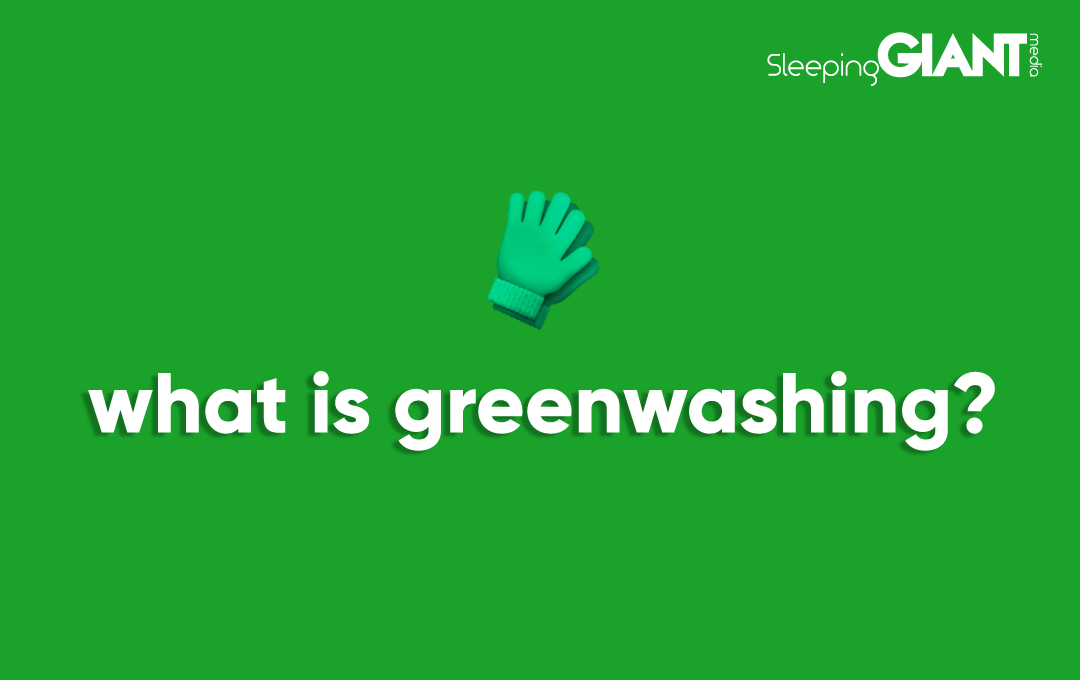
As consumers, we all take great comfort in using eco-friendly products. Generally speaking, we feel better about ourselves and our choices when the products and services we consume don’t damage the planet, right?
In fact, many of us wouldn’t think twice about actually paying more for these kinds of products. According to recent statistics, UK consumers are willing to pay an average of 25% more for ‘sustainable’ alternatives!
But this comes with a caveat. If companies know that a green label guarantees a higher price, what’s stopping them from slapping one on all their products without actually being ‘green’?
This, my friends, is a phenomenon known as ‘Greenwashing’.
What is greenwashing?
Greenwashing is the negative and misleading practice of labelling services & products as ‘green’ in the absence of any actual sustainable action.
The European Commission conducted a study last year that found that more than 42% of ‘green claims’ by businesses were either exaggerated, deceptive, or completely false. And, while the businesses investigated were mostly fashion and homeware retailers, greenwashing also happens in the service sector too.
Andrea Coscelli, Chief Executive of The Competitive and Markets Authority, has said on the matter, “Too many websites appear to be pushing misleading claims onto consumers, which means that companies offering products with a genuine environmental benefit are not getting the customers they deserve.” This is just one of the unfortunate outcomes of greenwashing.
How to spot greenwashing
If you’re thinking of partnering with a company or buying a product, stay vigilant for the following classic greenwashing techniques:
- Nature-themed labels, packaging, and marketing. This can take the form of earthy tones and leaves or greenery on the packaging. This might not always be a ‘tell’ of fraudulence but is often used to draw consumers in.
- Buzzwords such as ‘natural’, ‘organic’, and ‘free range’. When it comes to marketing copy, the devil is in the details. ‘Natural’ doesn’t mean it’s not harmful to the planet.
- Sweeping statements and generalisations. Usually, products practising greenwashing will be vague on purpose to avoid revealing the harmful ingredients or practices involved. The company Orangutan Alliance has discovered over 400 ways to refer to palm oil on packaging without actually mentioning it.
- Faulty certifications. Though a product may claim to have green credentials, this may not always be the case? Is it Rainforest Alliance certified?
In order to attract customers and compete with legitimate eco-friendly products, some businesses will utilise the techniques above.
Are there any laws against greenwashing?
Yes and no. There aren’t any official laws; however, there are lots of rules and guidelines. In 2021, greenwashing reached an all-time high. As a result, the Green Claims Code was published to help businesses better comply with the law.
The Green Claims Code has six distinct principles that aim to guide businesses away from unintentionally greenwashing their products and services:
- All claims must be truthful and accurate.
- All claims must be clear and unambiguous.
- All claims must not omit or hide important relevant information.
- Any comparisons must be fair and meaningful.
- Claims must consider the full life cycle of the product or service.
- All claims must be substantiated.
Point number 5 is especially important for businesses offering services as there are usually a whole host of environmentally-impactful things to consider. For example, supply chains, energy generation, and emissions.
Find out more about the Green Claims Code for businesses here.
Alongside this investigative action, serious cases of greenwashing will be dealt with under the Consumer Protection from Unfair Trading Regulations Act of 2008 ( or CPRs). This Act can see businesses who actively feign green credentials to mislead consumers landed with a hefty fine and put in bad standing.
What can your business do to avoid greenwashing?
Nothing is more important than the relationship with your customers and one of the most fundamental business values is transparency. So, claiming to have green services and products when you don’t (and then being found out) is less than ideal.
Instead, be honest and take action. Chances are your customers will respect and trust your business a whole lot more if you are open about your sustainability goals, rather than making vague claims.
At the end of the day, your business will stand in much better stead if it:
a) Is open and honest about its products and services
b) Sets goals and holds itself accountable
c) Works towards reducing its environmental impact
If you’re a business looking for inspiration on how to be more sustainable, we have the perfect blog for you. In the meantime, check out our Environmental Policy here.
Blog
Emerging Strategies in Luxury Goods Marketing
Millennials and Gen-Z have recently been reported reflecting that “prioritising...
Giant Wednesday
How To Optimise Images For Websites
Digital Marketing, technology & business insights, how-to's and explainer...
Follow Us
Sign Up For More
Stay up to date with the latest happenings, learnings, events & more with our GIANT Newsletters.
Contact Us
Top Floor, The Civic Centre, Castle Hill Avenue, Folkestone CT20 2QY.
Copyright © 2022 Sleeping Giant Media. All Rights Reserved.


